Kevin DeYoung's Blog, page 103
June 27, 2013
Pastors Need Your Care–Part I
 Guest Blogger: Jason Helopoulos
Guest Blogger: Jason Helopoulos
Pastors need your care. They aren’t above it, no matter what they may think. Even as pastors are to care for their congregations, so elders and members of the church should care for their pastors. Pastors need your care–no matter how old, seasoned, gifted, or confident. Today, we will suggest a few ways members of the congregation can care for their pastors. Tomorrow, we will look at a few suggestions for how elders can intentionally care for their pastors.
How members of the congregation can care for their Pastors:
Hunger to hear the Word of God preached
Invite your pastor and his family over for dinner (everyone assumes they receive a lot of invitations, but in many cases they don’t)
Pray for him regularly–that he would faithfully preach the Word, seek the Lord, delight more in the Lord, and have a love for the people he is blessed to minister to
Refrain from Monday morning emails, unless they are an encouragement. Mondays are hard days for many pastors.
Be willing to graciously challenge him if his teaching or preaching was in error
Respect his day off. Most pastors work long days and many evenings. They need a good day off.
Don’t expect him to come to everything. Your pastor still loves you even if he doesn’t make your child’s ballet performance, son’s honor society banquet, or even your mom’s funeral.
Send an encouragement card every once in a while
As tempting as it may be, don’t compare your pastor to “celebrity pastors”–Be thankful for him and his labor in your midst.
Babysit his kids for an evening, so he and his wife can go out on a date
Insist that the church provide a good salary and benefits for him–be generous.
If you have a new ministry idea, don’t propose it unless you are willing to do the hard work of setting it up and serving to see its vision realized
Refrain from telling him what you disliked about the sermon as you shake his hand on the way out of the sanctuary
Speak well of him to others in the congregation
Have no expectations regarding his wife and her service in the church beyond those you have for any other woman in the church
Be especially kind to his children
Understand that your pastor will not be gifted in every area of ministry and be content with that
Be teachable
Often remind yourself that he has a lot of different sheep under his care
Give him the benefit of the doubt regarding decisions, leadership, vision, etc.
Don’t ride your hobby horse too much and too often
The greatest care you can provide for your pastor is to pursue Christ with all that you are and serve the church with an uncommon zeal and humility
Please suggest in the comments further ways that you have found helpful in caring for pastors. The list should be long.
June 26, 2013
Simon Prevette
 Guest Blogger: Jason Helopoulos
Guest Blogger: Jason Helopoulos
You aren’t incredibly gifted? Well, welcome to the club of the “average.” Most of us dwell there. As an encouragement, let me introduce you to Simon Prevette. He is a man you have never heard of, but he is a man you should know.
The first church I had the honor of laboring at was a medium-size church in rural North Carolina. As has been my practice at every church I have attended or served, I spent the first six months seeking out the oldest members of the congregation. I have found that there are few things more important than knowing the history of the church to which you belong.
In my conversations with the older individuals (in their seventies and eighties) of the church, I kept hearing a particular name: Simon Prevette. Every older man in the congregation seemed to be unable to tell the history of the church without mentioning Simon. At first I thought Simon must have been one of the early pastors. However, that was far from the case. Everyone said the same things about Simon: he was small in stature, had a humble demeanor, was reticent to speak in public, often served behind the scenes, and was a very “ordinary” layman.
Though Simon was not the type of man people would point to as an incredibly gifted leader, he had a lasting impact upon the church that surpassed even the most gifted pastors this church had enjoyed over its history. How did Simon do this? In a very “average” way. On Sundays, the young boys of the church were invited to Simon’s house for afternoon walks. And as they walked through the woods, he would talk to them about trees, plants, birds, and…Christ. He did so in an unassuming manner. There was no weekly agenda, no plotting, and no preaching; just an older man spending time with young boys and allowing the Lord to work in His seemingly simple ways for profound ends. These now seventy-year old men all pointed to Simon Prevette as one, if not the key, instrument used by the Lord to draw them to saving faith.
I am thankful for high-talent men—those nine and ten talent individuals. However let’s be honest, most of us are at best, gifted with average talents. Our prayers don’t move mountains, revivals haven’t erupted from our evangelism efforts, and crowds aren’t flocking to hear us teach or preach. And yet, some of the greatest fruit born for the sake of the Kingdom stems from the labors of seemingly average-talent men and women. The Lord often uses the humblest of men in the most significant ways.
On one Sunday before the morning service began and during the announcements, I decided to demonstrate this very thing to the congregation. I asked everyone in the room who could say Simon Prevette was instrumental in their coming to saving faith to stand. These eight to ten older men of the congregation stood. I then asked everyone to look at these men, who many had known as their elders when they were children and young adults, and asked those who could say one of these men had been instrumental in the Lord drawing them to saving faith to stand. At this point, one-third of the room was now on its feet. Then came the incredible picture that I will never forget. I asked everyone to look at these individuals and to stand if any of these individuals had been used by the Lord in drawing them to saving faith. In a congregation which numbered around four hundred on that Sunday morning, there were maybe forty people left sitting.
Simon Prevette was by all accounts an average talent man, but the Lord used him in a mighty way. You don’t have to have ten talents. You don’t have to have nine. You just have to be faithful with what the Lord has given you. He can do mighty things with weak vessels.
I never met Simon. He had entered glory far ahead of my coming to the church. Yet, he has sat on my shoulder for over ten years as a faithful example and encouragement to me. The church could use a lot more men and women like Simon—saints who are just faithful where they are at, faithful with what they have been given, and content that God receive the glory.
June 25, 2013
Summer Study Leave 2013
 I serve a gracious and supportive church. Each summer I get 4-5 weeks of study leave, with some vacation sprinkled in for good measure. It all begins right now. So as you are reading this we are probably packed into our Expedition driving out to Colorado to spend most of July with my wife’s family. Once we get there, here’s some of what I’ll be doing.
I serve a gracious and supportive church. Each summer I get 4-5 weeks of study leave, with some vacation sprinkled in for good measure. It all begins right now. So as you are reading this we are probably packed into our Expedition driving out to Colorado to spend most of July with my wife’s family. Once we get there, here’s some of what I’ll be doing.
Speaking – I had the great honor yesterday of speaking at Crossway’s 75th anniversary banquet in St. Louis. This Thursday I will be flying out to California to speak at the Worship God conference. My two older boys will be flying with me—to attend the conference, and, not nearly as important I’m sure, to go to Legoland on Friday. After returning from California I turn around the next day to fly with my father-in-law to New Orleans where I’ll be speaking at the EFCA convention. My real break doesn’t start until I get back on July 2.
Reading – I have two boxes of books with me to keep me busy. I’ll be reading some Witherspoon related materials for my Ph.D., and for fun I have books with me on the Civil War, Abraham Kuyper, Darwinism, ethics, church polity, and maybe I’ll jump into Harry Potter if I get bored (haven’t read it before).
Writing – I have a handful of small writing projects to finish up, but the big project is to turn a series of sermons I did last spring into a book on the doctrine of Scripture. I’m really excited to be working on this project. I hope the end product will be a 225-250 page volume that is accessible, very lightly footnoted, winsome, free from jargon, and manifestly rooted in Scripture itself.
Blogging – I’ll be taking a break for the next week and having Jason Helopoulos fill in. Later in July I have Jackie Knapp, our former associate campus ministry director, taking a week for me. I’ll keep blogging the rest of the time, but hopefully less than usual.
Playing – I always enjoy spending time with my family and seeing my in-laws out in Colorado. I’m sure we will venture to the pool often and Chick-fil-A as much as possible. I enjoy running in the Springs too, and this year a couple friends are meeting me out there to climb a fourteener. Not my usual cup of tea, but better than camping.
That’s a little bit of my summer. I hope you all have a great next month. We plan to.
June 24, 2013
Monday Morning Humor
June 22, 2013
Teddy Roosevelt On Deliberately Not Having Children
Teddy Roosevelt, speaking in 1905 to the National Congress of Mothers:
There are many good people who are denied the supreme blessing of children, and for these we have the respect and sympathy always due to those who, from no fault of their own, are denied any of the other great blessings of life.
But the man or woman who deliberately foregoes theses blessings, whether from viciousness, coldness, shallow-heartedness, self-indulgence, or mere failure to appreciate aright the difference between the all-important and the unimportant–why such a creature merits contempt as hearty as any visited upon the soldier who runs away in battle, or upon the man who refuses to work for the support of those dependent upon him, and who though able-bodied is yet content to eat in idleness the bread which others provide. (Quoted in What to Expect When No One’s Expecting, 174-75)
An American President would never talk like this today; I find it remarkable that one ever did.
June 21, 2013
What to Expect When No One’s Expecting
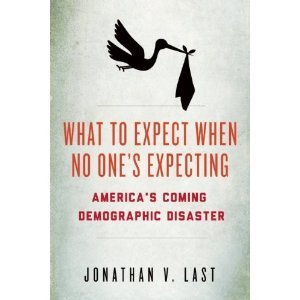 This book will be on my top ten list at the end of the year. It’s witty. It’s readable. It’s learned. And it’s important.
This book will be on my top ten list at the end of the year. It’s witty. It’s readable. It’s learned. And it’s important.
In What to Expect When No One’s Expecting: America’s Coming Demographic Disaster, Jonathan Last details the falling birthrate in America (and in the world) and explains why Very Bad Things inevitably follow population decline. Contrary to rumor, Last observes, overpopulation is not the black cloud on the horizon. In 1979, the world’s fertility rate was 6.0; today it’s 2.52 (p. 8). America’s fertility rate is just about the highest in the Western world, but at 1.93 it’s still well below that replacement rate of 2.1. And the only reason our rate is relatively high is because Hispanic women are doing most of the heavy lifting with a fertility rate of 2.35—a rate that is falling fast.
The fertility has fallen for a variety of reasons. The simplest explanation is that from big things like decline in church attendance and the increase of women in the workforce, to little things like mandatory car seats, our modern world discourages childbearing (16). Children are more expensive and less practically useful than they use to be. As Last observes, “pets have become fuzzy, low-maintenance replacements for children” (3). It’s no surprise that today only 3 percent of the world’s population lives in a country whose fertility rate is not declining (92). Countries like Italy, Japan, and Russia—whose populations are rapidly contracting—are in big trouble. America is in better shape, but heading in the same direction.
And This Matters Because…
So what’s so bad about falling fertility rates and decreasing populations? Doesn’t it mean more space, more food, and more time for everybody? Not exactly. When a society’s age structure gets older, entrepreneurship and inventiveness decrease, so does the supply of everything except for healthcare (28). Very practically, entitlement programs will consume ever-larger portions of the federal budget with fewer young workers to pay into the Ponzi scheme (27). With plenty of numbers and examples, Last makes his case that a declining population—which is what you eventually get with falling fertility rates—is one of the worst signs of national health. As Last puts it, quoting Mark Steyn, “there is no precedent in human history for economic growth on declining human capital” (36).
I won’t take the time to summarize every chapter, though everyone merits discussion. From start to finish I found myself underlining remarkable statistics and fascinating observations. For example:
It used to be that the elites had more children, but now they noticeably have fewer children than people on the lower end of the social spectrum. In the culture’s eyes, children have gone from being a marker of success to an indicator of failure (72).
The percentage of women in America who have five or more children is 1.8 percent (79).
If current fertility rates remain constant in Europe, the population of the continent will shrink from 738 million to 482 million by the end of century (97).
In 1950, the median age in America was 30. In 2000, it was 35. By 2050 it will be 40, the median age in Florida today (100).
Fertility rates, especially among whites, is one of the best predictors of whether states vote Republican or Democratic.
Many Americans fear the rise of an expansionist China, but according to Last, with the legacy of China’s One Child Policy and a male-to-female ration of 123-100, China’s future is one of being a declining superpower with a rapidly contracting economic base and an unstable political structure (136).
More than once, Last tries to find a silver-lining in our cloudy demographic future. But his moments of hopefulness are short-lived. There are simply no examples of widespread success in reversing the trend of falling fertility. The best illustration Last can muster is how the birth rate in Georgia (the country) increased after Patriarch Ilia II promised to personally baptize any child born to parents who already had two or more children (159). Hardly a recipe for success in the United States.
Blessed to Be a Blessing (and Have Babies)
And yet, the Georgian illustration hits on a powerful truth: religious people have more children than the non-religious. Our ethics professor at seminary was well known for making the case in his class that in ordinary circumstances (allowing for illness, danger, extremely unique ministry callings, etc.), Christian couples, in keeping with the creation mandate, should try to have three or more children. He wasn’t calling for maximum fertility (he had five children). He wasn’t shaming those who had already made other choices. But he was offering a strong exhortation. A well placed one in my opinion.
The hope for a demographic reversal in America is in the church. More than that, one of the best strategies for cultural influence and societal change is for Christians to keep having babies. “Militant fecundity” is the phrase that comes to mind. As Last notes in his conclusion, quoting two well known demographers, “Conservative religious families are larger than theologically liberal families. Conservatives also are better at retaining their children within the fold than liberals” (173). These demographers go so far as to fear a short-run rise in secularism (in the present), giving way to a growing fundamentalism (in the future). I’m not convinced that’s the next chapter in America’s story, but it seems plausible that the only reasonable chance we have of turning around our falling fertility is an increase in religious commitment.
If there is hope for avoiding the Very Bad Things the book outlines it will be found in the children of religious families. Secular Americans have a fertility rate of just 1.66, compared with a rate of 2.3 and 2.2 for observant Catholics and Protestants (172). Surveys show that 21 percent of non-religious Americans want to have three or more children. This number goes up to 36 percent for Protestants and 34 percent for Catholics. And when you look at those who attend church every week, 41 percent say three or more children is ideal (86). In the not too distant future, the only couples replacing themselves in America will be religious couples. As Last puts it, although there are many good reasons to have a baby, at the end of the day, “there’s only one good reason to go through the trouble a second time: Because you believe, in some sense, that God wants you too” (170). The basic reason countries stop having children is because they’ve come to see offspring as a liability rather than a source of hope (175). As Christians, we know better.
June 20, 2013
Book Briefs
It’s been awhile since I’ve done Book Briefs, and I’ve had some flight time for reading, so there are a few more books here than usual.
 Garnet Howard Milne, The Westminster Confession of Faith and the Cessation of Special Revelation: The Majority Puritan Viewpoint on Whether Extra-Biblical Prophecy Is Still Possible (Paternoster 2007). This is a terrific of example of top notch scholarship serving the church. Milne has poured over the primary literature in trying to determine what the Westminster Confession meant by the so called “cessation clause” in WCF 1:1. He concludes that most of the Puritans were cessationists, but nuanced their position by making a distinction between immediate and mediate revelation and by allowing for supernatural providences in dreams and visions.
Garnet Howard Milne, The Westminster Confession of Faith and the Cessation of Special Revelation: The Majority Puritan Viewpoint on Whether Extra-Biblical Prophecy Is Still Possible (Paternoster 2007). This is a terrific of example of top notch scholarship serving the church. Milne has poured over the primary literature in trying to determine what the Westminster Confession meant by the so called “cessation clause” in WCF 1:1. He concludes that most of the Puritans were cessationists, but nuanced their position by making a distinction between immediate and mediate revelation and by allowing for supernatural providences in dreams and visions.
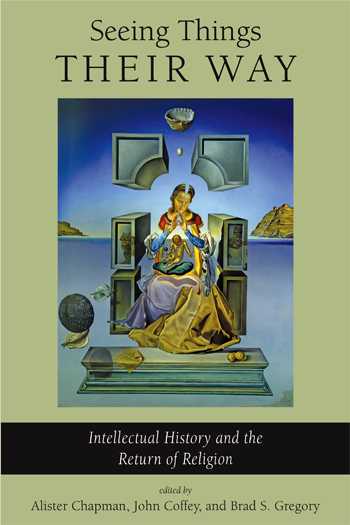 Alistair Chapman, John Coffey, and Brad S. Gregory (eds), Seeing Things Their Way: Intellectual History and the Return of Religion (University of Notre Dame Press 2009). This collection of essays seeks to incorporate the insights of Quentin Skinner and the “Cambridge School” of intellectual historians, especially as it relates to religious history. The chapters by Chapman, Coffey, Muller, and Van Asselt were especially helpful. Two big takeaways: religious history cannot be bracketed and set apart from the rest of intellectual history, and intellectual history must deal with more than the bald promulgation of ideas from great thinkers.
Alistair Chapman, John Coffey, and Brad S. Gregory (eds), Seeing Things Their Way: Intellectual History and the Return of Religion (University of Notre Dame Press 2009). This collection of essays seeks to incorporate the insights of Quentin Skinner and the “Cambridge School” of intellectual historians, especially as it relates to religious history. The chapters by Chapman, Coffey, Muller, and Van Asselt were especially helpful. Two big takeaways: religious history cannot be bracketed and set apart from the rest of intellectual history, and intellectual history must deal with more than the bald promulgation of ideas from great thinkers.
 Andrew Atherstone and David Ceri Jones (eds), Engaging with Martyn Lloyd-Jones: The Life and Legacy of ‘the Doctor’ (Apollos 2011). As a longtime MLJ fan/disciple/afficianado/what-have-you I couldn’t put this book down. I read all 350 pages in a couple days. J.I. Packer’s Foreword is magnanimous. The opening chapter on Lloyd-Jones and his biographers is provocative. Andrew Atherstone on the secession crisis is fair and balanced. John Coffey on Lloyd-Jones the historian serves as both an encouragement and a warning to pastors who want to draw lessons from church history. This book will help you better understand the great influence, great stature, great ability, and many of the great contradictions and not a few weaknesses of the Doctor.
Andrew Atherstone and David Ceri Jones (eds), Engaging with Martyn Lloyd-Jones: The Life and Legacy of ‘the Doctor’ (Apollos 2011). As a longtime MLJ fan/disciple/afficianado/what-have-you I couldn’t put this book down. I read all 350 pages in a couple days. J.I. Packer’s Foreword is magnanimous. The opening chapter on Lloyd-Jones and his biographers is provocative. Andrew Atherstone on the secession crisis is fair and balanced. John Coffey on Lloyd-Jones the historian serves as both an encouragement and a warning to pastors who want to draw lessons from church history. This book will help you better understand the great influence, great stature, great ability, and many of the great contradictions and not a few weaknesses of the Doctor.
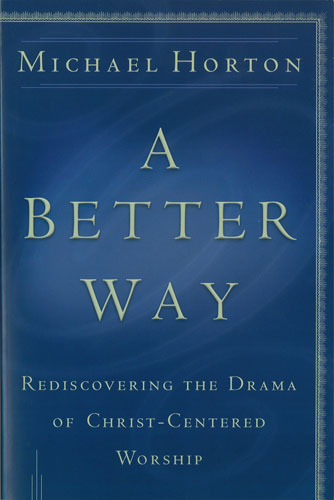 Michael Horton, A Better Way: Rediscovering the Drama of Christ-Centered Worship (Baker 2002). Being over a decade old, the controversies running through the book sound a bit dated at times, but the theological case Horton makes for worship as gospel-centered covenant renewal is not. The volume is a good place to start in thinking more deeply about worship, especially if you are coming out of an entertainment driven model.
Michael Horton, A Better Way: Rediscovering the Drama of Christ-Centered Worship (Baker 2002). Being over a decade old, the controversies running through the book sound a bit dated at times, but the theological case Horton makes for worship as gospel-centered covenant renewal is not. The volume is a good place to start in thinking more deeply about worship, especially if you are coming out of an entertainment driven model.
 Robert G. Rayburn, O Come, Let Us Worship: Corporate Worship in the Evangelical Church (Wipf and Stock 1980). I can’t imagine any Reformed or Presbyterian pastors or worship leaders not being helped by this book (and non-Reformed folks will benefit too). I’m sure you’ll disagree with a few of Rayburn’s strong opinions (I did in places), but the book will get you thinking theologically about the elements, the flow, and the content of your worship services. An overlooked worship resource.
Robert G. Rayburn, O Come, Let Us Worship: Corporate Worship in the Evangelical Church (Wipf and Stock 1980). I can’t imagine any Reformed or Presbyterian pastors or worship leaders not being helped by this book (and non-Reformed folks will benefit too). I’m sure you’ll disagree with a few of Rayburn’s strong opinions (I did in places), but the book will get you thinking theologically about the elements, the flow, and the content of your worship services. An overlooked worship resource.
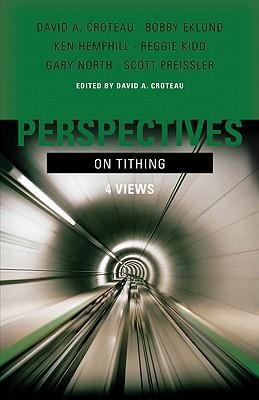 David A Croteau (ed.), Perspectives on Tithing: Four Views (B&H 2011). This volume has the strengths and weaknesses of the other book in this series. Setting different perspectives side by side and forcing them to interact is edifying and instructive. It’s also redundant and (depending on the contributor) snippy at times. Croteau strongly disagree with the continuing obligation to tithe (though not with generous giving), but he’s put together a diverse set of thinkers who present good arguments for their respective perspectives. A helpful resource for pastors or church leaders.
David A Croteau (ed.), Perspectives on Tithing: Four Views (B&H 2011). This volume has the strengths and weaknesses of the other book in this series. Setting different perspectives side by side and forcing them to interact is edifying and instructive. It’s also redundant and (depending on the contributor) snippy at times. Croteau strongly disagree with the continuing obligation to tithe (though not with generous giving), but he’s put together a diverse set of thinkers who present good arguments for their respective perspectives. A helpful resource for pastors or church leaders.
 Alistair Begg and Sinclair B. Ferguson, Name above All Names (Crossway 2013). A new book by two terrific pastors and gifted preachers who should write more (yes, they are Scottish too!). Here’s my blurb: “You can’t have too many good books about the person and work of Jesus Christ. And this is a great book. Alistair Begg and Sinclair Ferguson handle the most doctrines of the faith with clarity, fidelity, pastoral insight, and good humor. New Christians, non-Christians, and long-time Christians will benefit from these superb expositions.”
Alistair Begg and Sinclair B. Ferguson, Name above All Names (Crossway 2013). A new book by two terrific pastors and gifted preachers who should write more (yes, they are Scottish too!). Here’s my blurb: “You can’t have too many good books about the person and work of Jesus Christ. And this is a great book. Alistair Begg and Sinclair Ferguson handle the most doctrines of the faith with clarity, fidelity, pastoral insight, and good humor. New Christians, non-Christians, and long-time Christians will benefit from these superb expositions.”
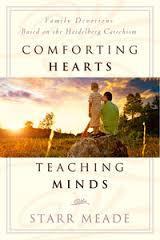 Starr Meade, Comforting Hearts, Teaching Minds: Family Devotions Based on the Heidelberg Catechism (P&R 2013). I was happy to provide an endorsement for this book as well: “I am always eager for new resources on the Heidelberg Catechism. I hope Starr Meade’s latest contribution reaches a wide audience, leading more and more families to get acquainted with Heidelberg and to think to themselves, ‘Where has this been all my life?!’”
Starr Meade, Comforting Hearts, Teaching Minds: Family Devotions Based on the Heidelberg Catechism (P&R 2013). I was happy to provide an endorsement for this book as well: “I am always eager for new resources on the Heidelberg Catechism. I hope Starr Meade’s latest contribution reaches a wide audience, leading more and more families to get acquainted with Heidelberg and to think to themselves, ‘Where has this been all my life?!’”
 Scott Turansky and Joanne Miller, Say Goodbye to Whining, Complaining, and Bad Attitudes in You and Your Kids! (Waterbook 2000). This book doesn’t have the same gospel-centrality we are used to in our circles. Nor am I convinced that “honor” is the overarching theme the authors want to make it to be. But this is still a helpful, practical book with lots of stories and much good commonsense. My biggest takeaway was to look more carefully at the whining, complaining, bad attitude in myself.
Scott Turansky and Joanne Miller, Say Goodbye to Whining, Complaining, and Bad Attitudes in You and Your Kids! (Waterbook 2000). This book doesn’t have the same gospel-centrality we are used to in our circles. Nor am I convinced that “honor” is the overarching theme the authors want to make it to be. But this is still a helpful, practical book with lots of stories and much good commonsense. My biggest takeaway was to look more carefully at the whining, complaining, bad attitude in myself.
 Thomas Sowell, Intellectuals and Race (Basic Books 2013). As the most popular conservative African American scholar writing about race, I always find Sowell’s essays thought provoking, well researched, and reliably contrarian. In this volume you’ll find many of the ideas that populate Sowell’s other works: warnings against “cosmic justice,” disagreements with modern notions of equality, critical interaction with the assumption that history determines destiny, and trenchant criticism of “scientific” racial theories in the Progressive era in early twentieth century America. Sowell is one of the most accessible and helpful “public intellectuals” writing today.
Thomas Sowell, Intellectuals and Race (Basic Books 2013). As the most popular conservative African American scholar writing about race, I always find Sowell’s essays thought provoking, well researched, and reliably contrarian. In this volume you’ll find many of the ideas that populate Sowell’s other works: warnings against “cosmic justice,” disagreements with modern notions of equality, critical interaction with the assumption that history determines destiny, and trenchant criticism of “scientific” racial theories in the Progressive era in early twentieth century America. Sowell is one of the most accessible and helpful “public intellectuals” writing today.
Bonus! Here are a few books I’ve been meaning to read, but haven’t gotten to yet: Bobby Jamieson’s little book Sound Doctrine (Crossway 2013), a new book on preaching by Gary Millar and Phil Campbell called Saving Eutychus, and a new volume by Matthew Barrett on the Canons of Dort (Joshua Press 2013) which looks outstanding.
June 19, 2013
Interview with Henry Luke Orombi
My dad, Lee DeYoung, just returned from a three week trip to South Sudan and Uganda. A highlight of that trip was his visit to the home of recently retired Church of Uganda Archbishop Henry Luke Orombi. Having stepped away from denominational administration, Archbishop Orombi is now focusing on Biblical preaching by radio through his weekly Words of Hope broadcasts in English and in his mother tongue Arur.
My dad had an opportunity to videotape a wide-ranging 30-minute interview with Henry near Nebbi, Uganda. Here is a 7-minute clip of that interview.
A couple of the highlights are transcribed below.
On the unchanging Word of God (2:30 through 5:03)
We in Africa and in Uganda in particular look to the West for the gospel because they brought the gospel to us. And when the gospel was opened to us, we looked at what God is saying to us through the Scriptures. We embraced it, we loved it, we proclaimed it. Eventually the West began to put aside the Bible. They picked up human wisdom and understanding.
Thinking of believers, now I believe that is where the problem started. The moment you’re far away from your Bible and you are not making a difference with your Bible, then you are losing God’s wisdom to help you to walk righteously before Him. Now that began to be the thinking of the leadership in the West. People went to human understanding, human philosophy and interpretation.
People forgot that many years ago their ancestors died for this gospel. They came into Africa which was so hostile and difficult to come in. They saw their life for the gospel. Dr. David Livingstone died in Africa, Bishop James Huntington, we killed him here in Uganda. But the love of God had driven him to come to Uganda. Now that initial love begun to go, lukewarmness became to come into churches in the West.
Now then the leadership of course of the Anglican communion is in the West. And yet the gospel of their fathers and their ancestors, which they were embracing at the moment, so now we are in two clubs. People who are with the original message and people who think with the new modern message and could not agree. And we just did not agree that some of the practices that are advancing to the communion was not biblically based. The Bible clearly talks about it. The way you like it doesn’t change the truth that is in the Scripture.
Now we wanted to hold the truth in the scripture and walk with it. Why? Because our ancestors brought it to us. Now they are telling us to throw it away. How can we? And that is how we locked horns and we broke apart and I mean the Anglican communion is in pieces. We are no longer the communion of fellowship, other that people who are pulling at each other. So we stood our ground and I retired with a clear sense in my mind that we shall not be ashamed to preach that gospel that Paul and Peter preached. We remain in that steadfast truth that will not change. Any other thing human crafted will change, will go, but what is in the Word of God will never change.
On the acceptance of homosexuality in the West (5:03 through 6:21)
We made a decision in 2003 that when Gene Robinson was going to be consecrated a bishop, we would close our relationship with American church. They went ahead and did it and we stopped our relationship! We even said we don’t need your money. And they double it—whatever they wanted to do. And we said no we don’t need your money. We will stick with the Word of God.
We faithfully went back to God and said, “Lord, our portion is with you. We will work with you, whatever happens. If you are going to be hungry, shall be hungry but in your Name.” Then God began to open doors, possibilities came in…the church will have enough resources to now run whatever ministry we are going to do. Now it would have never happened if it never took a risk. Now everything in faith if risk. Resources stopped, but God’s blessings never stops.
June 18, 2013
When Solomon Tweeted
@KingSolomon
Answer a fool according to his folly, lest he be wise in his own eyes.
@MoabiteMan
RT @KingSolomon Answer a fool according to his folly, lest you be like him yourself. // Very subtle dude! Talk to me in person next time!
@SonsOfAdonijah
Hey folks, check out Solomon. He’s at it again. Typical! RT @KingSolomon Answer a fool according to his folly, lest you be like him yourself.
@EdomRules
@SonsOfAdonijah @MoabiteMan At least everyone can see what he’s really like. #insults #namecalling #immature
@MoabiteMan
Hey @KingSolomon, at least have the guts to tell who u r talking about.
@SonsOfAdonijah
Don’t bother @MoabiteMan, he won’t give you an answer. #yellowbellied
@QueenOfSheba
Did I miss something? How do we know hes thinking about anyone in particular?
@EdomRules
@QueenOfSheba, do they teach you grammar in Queen School? Can I buy an apostrophe please?! #he’s
@QueenOfSheba
Hilarious. I just think @KingSolomon usually makes a lot of sense.
@EdomRules
@QueenOfSheba, I’d say he makes more money than he makes sense!
@SonsOfAdonijah
Boom goes the dynamite! @EdomRules @QueenOfSheba
@KingLemuel
Great stuff here. RT @KingSolomon Answer a fool according to his folly, lest you be like him yourself.
@Agur_iffic
RT @King Solomon Answer a fool according to his folly, lest you be like him yourself. // Nice! #crazymadwisdom
@SonsOfAdonijah
Fan boys! @KingLemuel @Agur_iffic
@EdomRules
Seriously, this has to stop. I thought the God of Israel was better than this.
@SonsOfAdonijah
The God I worship doesn’t call his beloved creatures fools.
@MoabiteMan
Still no answer from @KingSolomon. Figures. The guy is too busy counting his gold and killing my people. #hypocrite
@EdomRules
I wonder if he knows the pain he’s caused. Runs in the family. #rememberuriah
@SonsOfAdonijah
@EdomRules@MoabiteMan I guess we’re just “fools.” Not worth the king’s time
@SleepySluggard
RT @EdomRules @MoabiteMan I guess we’re just “fools.” Not worth the king’s time. // Probably working on those fortune cookie thingys! #latetotheparty
@SonsOfAdonijah
Or planning another wedding!!
@EdomRules
Or collecting more exotic animals. #cruelty #baboonsareourfriends #animalshavefeelingstoo
@MoabiteMan
I just hope @KingSolomon can learn from this mistake and stop these hurtful tweets.
@KingSolomon
Answer not a fool according to his folly, lest you be like him yourself.
June 17, 2013
Monday Morning Humor
Yes, Father’s Day has come and gone. But that doesn’t mean you can’t still think of great gifts for dear old dad.



